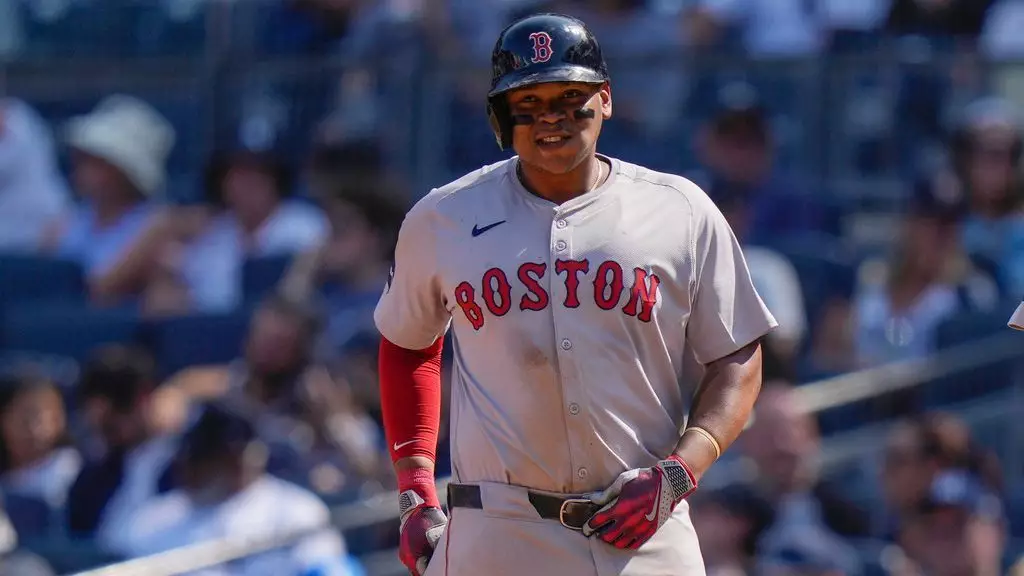In the dynamic world of Major League Baseball, position changes can often lead to confusion and frustration for players. Such transitions demand not only physical adaptability but also mental resilience, as players must leave behind the comfort of a familiar role. This complexity is evident in the case of Rafael Devers, the prolific designated hitter for the Boston Red Sox. When the team management approaches a player to switch positions—especially following an injury to a teammate—it can feel like an upheaval of their professional identity. Devers’ recent comments shed light on the emotional and strategic challenges players face when navigating their roles on the team.
A Clarion Call for Clarity in Roles
Devers, a three-time All-Star, has expressed his firm stance against switching back to a position he has left behind. After the Red Sox’s first baseman, Triston Casas, suffered a serious injury, the management turned to Devers as a possible substitute. However, he counters this proposition by highlighting how the team had previously assured him a stable role as a designated hitter, particularly after signing infielder Alex Bregman to play third base. “They came to me and talked to me about it,” Devers observed, emphasizing the inconsistency in expectations from management. This raises critical questions: Should players be expected to juggle multiple positions, especially when they have established a rhythm and specialty in one?
The Burden of Flexibility
Devers’ relationship with the Red Sox’s front office reflects a broader dilemma many athletes face. While versatility is often celebrated as a valuable asset, the pressure to adapt can sometimes override an athlete’s preference for stability. In his candid statements, Devers elaborated on his reluctance, saying, “I know I’m a ballplayer, but at the same time, they can’t expect me to play every single position out there.” Here, he draws a crucial line between being a versatile player and being a utility asset—a distinction that holds profound implications not just for individual performance, but also for team dynamics.
His words suggest an urgent need for accountability from management, an idea he subtly shares with Craig Breslow, the Red Sox’s chief baseball officer. Devers urges the team to explore other options to fill the gap left by Casas instead of relying on him to take on a role outside of his expertise. The underlying message is clear: organizational clarity regarding player roles plays a vital part in maintaining morale and performance levels.
Valuing Player Autonomy
The communication breakdown between Devers and the Red Sox management points to a larger trend within professional sports, where the voices of players often get drowned out by corporate decision-making. While a player’s willingness to adapt is commendable, true success must consider their personal boundaries and preferences. As Devers articulated, he views himself as a full-time designated hitter now, reflecting his self-awareness about strengths and limitations in a professional context. “I don’t feel they stayed true to their word,” he said, encapsulating a sentiment that resonates with many athletes forced to navigate the turbulent waters of organizational demands.
Such frustration isn’t isolated to Devers. Throughout professional sports, players are often caught between the desires of the team and their own well-being. Allowing athletes the autonomy to define their own roles can lead to greater satisfaction and performance on the field.
The Inevitability of Injuries and Their Impact
Injuries, like what happened to Casas, are a cruel reality in sports, often resulting in cascading impact on team structure and player dynamics. They not only affect team strategy but can also unsettle the established roles of players, forcing management to make hasty decisions that may not align with the athletes’ interests. Devers raises an important question on the ramifications of such management decisions on a player’s identity. As he prepares for each game, the need for stability in his role provides not just comfort but also fosters the confidence necessary for peak performance.
Rafael Devers’ resolute stance against relocating positions serves as a poignant reminder of the complexities athletes face in the high-pressure environment of Major League Baseball. His commitment to his designated hitter role underscores the necessity for teams to value player autonomy while managing unexpected challenges like injuries. When athletes and management engage genuinely and clearly, everyone stands to benefit, especially the fans who crave the most competitive performances from their teams.


Leave a Reply